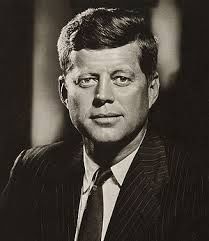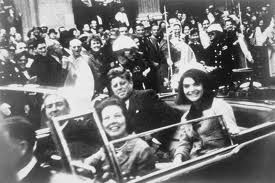November, 2013
A National and Personal Tragedy - Fifty Years Later
by Larry
I was, as I recall, in my chemistry course lab as an undergrad at the University of Texas at Austin, working on a gas release experiment and using a Bunsen burner, test tubes, and a small assortment of organic compounds, when word began to filter in among we students on that cool fall Friday afternoon, November 22, 1963, that President John Fitzgerald Kennedy had been assassinated in Dallas.
With the confirmation of that reality, gloom settled over me, the campus, our nation, and in fact the world, for JFK had been loved around the globe as perhaps no other U.S. President before or since. He was a cherished fresh face and a darling of Hollywood, with such icons as Frank Sinatra having helped to get him elected.
 He and his family and administration were vibrant, new, upbeat, young, exciting, romantic, seemingly a combined turning of the page of history, ending ages of cynicism and cold war, of politics as usual, of ever increasing weapon build-ups toward nuclear annihilation, of the outsize influence of a military-industrial complex, of racism, school segregation, and voter suppression in the South, of Mafia power, influence, and corruption throughout our cities and the halls of government. He was well educated, confident, suave, eloquent, smart, witty, charming, literate, and a war hero who, against great odds, had saved his men after their PT boat had been sunk near enemy waters in World War II. He also inaugurated the Peace Corps (to which I had promptly applied, but was politely told I would be of greater value after finishing my degree). He had set us on a course toward Moon walking and other amazing space exploits before the end of the decade. He also initiated key civil rights actions.
He and his family and administration were vibrant, new, upbeat, young, exciting, romantic, seemingly a combined turning of the page of history, ending ages of cynicism and cold war, of politics as usual, of ever increasing weapon build-ups toward nuclear annihilation, of the outsize influence of a military-industrial complex, of racism, school segregation, and voter suppression in the South, of Mafia power, influence, and corruption throughout our cities and the halls of government. He was well educated, confident, suave, eloquent, smart, witty, charming, literate, and a war hero who, against great odds, had saved his men after their PT boat had been sunk near enemy waters in World War II. He also inaugurated the Peace Corps (to which I had promptly applied, but was politely told I would be of greater value after finishing my degree). He had set us on a course toward Moon walking and other amazing space exploits before the end of the decade. He also initiated key civil rights actions.
The media adored him, and their stories and interviews and vast blanketing of the airways with devoted photos of he and his family ushered in a fantasy of Camelot on our American shores.
Later, after the splattered brains, the blood on Jacqueline's dress, the live TV broadcast (later replayed over and over) of the shooting of Lee Harvey Oswald while that prime suspect was in Dallas police custody, and after the brave little John, Jr., salute as Kennedy's coffin was carried down Washington's Pennsylvania Avenue, and still later after the (white wash?) Warren Commission Report had been published and bought and perused by millions, we learned of a different Kennedy, one who was a womanizer, had made major enemies, had quietly given up our missiles in Turkey to help end the Cuban Missile Crisis but meanwhile brought us closer than ever before to nuclear war, who abandoned thousands of Cubans whom he had encouraged to rise up against Fidel Castro, who had used against Richard Nixon a phantom notion of a "missile gap" for which he blamed Republicans, whose famous book, Profiles in Courage, may have been ghostwritten, who was ill with Addison's Disease, yet lied about it when his Democratic rival, Lyndon Baines Johnson, brought it up before the final primaries, whose affair with Marilyn Monroe may have helped precipitate the actress taking her life, who failed in attempts to carry out many of his policies, who got into serious contests of wills with the Mafia and tough, racist leaders among the Democratic Party in southern states, and who, by stepping up our clandestine operations in Indochina, facilitated our getting involved in the Vietnam War, our worst defeat and our most protracted conflict prior to Iraq and Afghanistan. Yet none of this would seriously tarnish for many of his ardent followers the brilliant and promising picture that Jack Kennedy had presented, especially so in martyrdom.
With his passing, we returned evidently to a time of relative mean spiritedness, suspicion, corruption, and brutality. Much progress occurred under Johnson, Nixon, Ford, Carter, and Reagan. But for millions their records could not compete favorably with that of the slain leader. The brief period of promise and high expectations was over. The cold war heated up again. Vietnam became a dominant theme in America's story. Race relations became more tense, not merely in the South but in major cities across our nation. Many a disaffected youth, including yours truly, turned to counterculture and protest.
 Arguably JFK had been placed on too large a pedestal for reality to have sustained our high hopes of him. And perhaps even the assassination, shocking as it was at the time, was not an aberration but simply part of the way things work in our brand of democracy. After all, in a number of ways we are a violent society, with a history till fairly recently of multiple hate crime lynchings and with still tens of thousands of shootings a year and more arrests and incarcerations than any other country. Hardly rare, political murders are a fact of life in America, just one of the means we have for effecting change and getting rid of folks when the more touted ballot box or legal methods do not suffice.
Arguably JFK had been placed on too large a pedestal for reality to have sustained our high hopes of him. And perhaps even the assassination, shocking as it was at the time, was not an aberration but simply part of the way things work in our brand of democracy. After all, in a number of ways we are a violent society, with a history till fairly recently of multiple hate crime lynchings and with still tens of thousands of shootings a year and more arrests and incarcerations than any other country. Hardly rare, political murders are a fact of life in America, just one of the means we have for effecting change and getting rid of folks when the more touted ballot box or legal methods do not suffice.
So was the Kennedy assassination part of a conspiracy, for which there were several possible sets of perpetrators, or the deranged act of a lone gunman? People seem to be as vehement and divided on this as in whether there really are flying saucers or on the nature of a Supreme Being. Unfortunately, whether through early incompetence or design, there is not a good trail of forensic or other evidence to be followed, and so the question likely will never be fully put to rest, in contrast, for example, to what is known of Lincoln's murder.
The Smithsonian Magazine is a respected, normally reliable publication. In one of its latest issues (October, 2013), an article, "What Does the Zapruder Film Really Tell Us?," by Ron Rosenbaum, indicates film footage from the moments of the JFK shooting may show that bullets were fired both from behind and in front of the President, impossible if Oswald alone had been involved. Yet, like so much else of the evidence, this is open to another interpretation. Perhaps the President's head was simply rebounding backward after having been knocked into his chest by a shot from behind.
What can be said for certain is that the killing, perhaps the first one of a head of state recorded on film in real time and repeatedly broadcast on television to a grieving nation, was a shattering event for our country and for many millions of its citizens. This was the case for me as well.
 He and his family and administration were vibrant, new, upbeat, young, exciting, romantic, seemingly a combined turning of the page of history, ending ages of cynicism and cold war, of politics as usual, of ever increasing weapon build-ups toward nuclear annihilation, of the outsize influence of a military-industrial complex, of racism, school segregation, and voter suppression in the South, of Mafia power, influence, and corruption throughout our cities and the halls of government. He was well educated, confident, suave, eloquent, smart, witty, charming, literate, and a war hero who, against great odds, had saved his men after their PT boat had been sunk near enemy waters in World War II. He also inaugurated the Peace Corps (to which I had promptly applied, but was politely told I would be of greater value after finishing my degree). He had set us on a course toward Moon walking and other amazing space exploits before the end of the decade. He also initiated key civil rights actions.
He and his family and administration were vibrant, new, upbeat, young, exciting, romantic, seemingly a combined turning of the page of history, ending ages of cynicism and cold war, of politics as usual, of ever increasing weapon build-ups toward nuclear annihilation, of the outsize influence of a military-industrial complex, of racism, school segregation, and voter suppression in the South, of Mafia power, influence, and corruption throughout our cities and the halls of government. He was well educated, confident, suave, eloquent, smart, witty, charming, literate, and a war hero who, against great odds, had saved his men after their PT boat had been sunk near enemy waters in World War II. He also inaugurated the Peace Corps (to which I had promptly applied, but was politely told I would be of greater value after finishing my degree). He had set us on a course toward Moon walking and other amazing space exploits before the end of the decade. He also initiated key civil rights actions.
 Arguably JFK had been placed on too large a pedestal for reality to have sustained our high hopes of him. And perhaps even the assassination, shocking as it was at the time, was not an aberration but simply part of the way things work in our brand of democracy. After all, in a number of ways we are a violent society, with a history till fairly recently of multiple hate crime lynchings and with still tens of thousands of shootings a year and more arrests and incarcerations than any other country. Hardly rare, political murders are a fact of life in America, just one of the means we have for effecting change and getting rid of folks when the more touted ballot box or legal methods do not suffice.
Arguably JFK had been placed on too large a pedestal for reality to have sustained our high hopes of him. And perhaps even the assassination, shocking as it was at the time, was not an aberration but simply part of the way things work in our brand of democracy. After all, in a number of ways we are a violent society, with a history till fairly recently of multiple hate crime lynchings and with still tens of thousands of shootings a year and more arrests and incarcerations than any other country. Hardly rare, political murders are a fact of life in America, just one of the means we have for effecting change and getting rid of folks when the more touted ballot box or legal methods do not suffice.